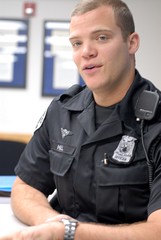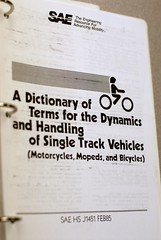Officer Darke Hull of the Portland Police Bureau Traffic Division is one of six Portland officers to have been recently certified as a Pedestrian and Bicycle Crash Investigation expert. The certification came after a rigourous, 5-day course offered by the Institute of Police Technology and Management (IPTM).
I met with Officer Hull to learn more about the class and his role within the PPB.
Officer Hull has been on the force for 7 years, with three of those in the Traffic Division. He is a motorcycle officer on one of two Fatal Crash Investigation teams. He and his team investigate around 50 fatal incidents a year and he also works Critical Mass and other events.
Officer Hull is a soft-spoken guy who is deeply committed to his job. He seemed like more of a student than a police officer as he presented stacks of documents and papers from the course and told me he keeps them by his nightstand so he can study them every night. In Hull’s words he has “a willingness to do whatever it takes” to do his job.
The class, partially funded by PDOT, was not some willy-nilly seminar, where everyone goes home with a nice notebook they never read. This was a very intensive certification course with a final exam, that “not everyone passed” according to Hull.
The class started off with a pre-test in physics. Officer Hull showed me page after page of calculus notes with complex equations that help them determine things like speed of the car and bicycle relative to the distance they were found from each other at the scene.
The page titled, “equations for examining airborne, spinning projectiles,” made my stomach turn.
One portion of the class even touched on how road rage can effect crash analysis.
The final part of the class was a full-blown, reconstructed crash scene. Lifelike dummies were used and many types of crashes were simulated. Each crash was analyzed by teams and their findings were critiqued by other officers and by officials from the IPTM, then presented to the entire class.
I was amazed at the attention to detail that goes into a bicycle crash investigation.
Hull said:
“I’m driven by our goal…which is to find out why the crash happened. I always hope it’s a problem with the roadway, because we can fix that. But unfortunately most of the time it’s driver/rider error.”
Even though most of will never be involved in a serious injury or fatal crash, it’s good to know Officer Hull and his partners have such in-depth, bicycle-specific training. The more they know about bikes, the more fair and accurate their crash investigation findings will be.



